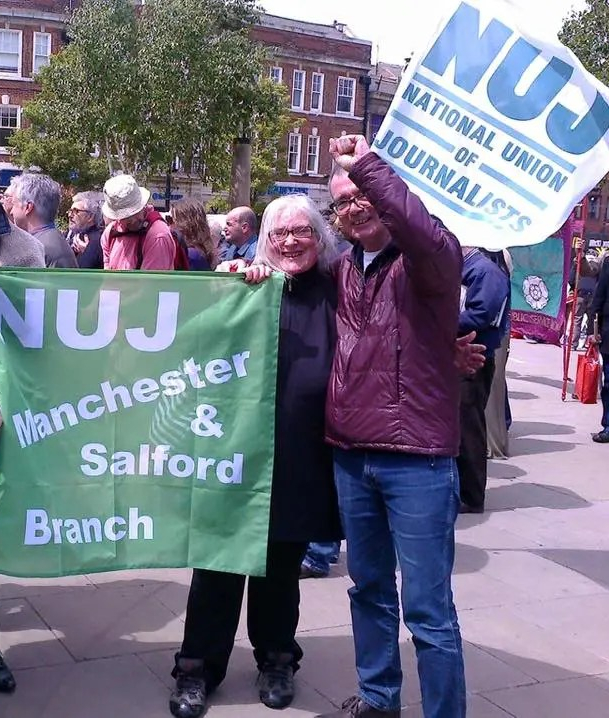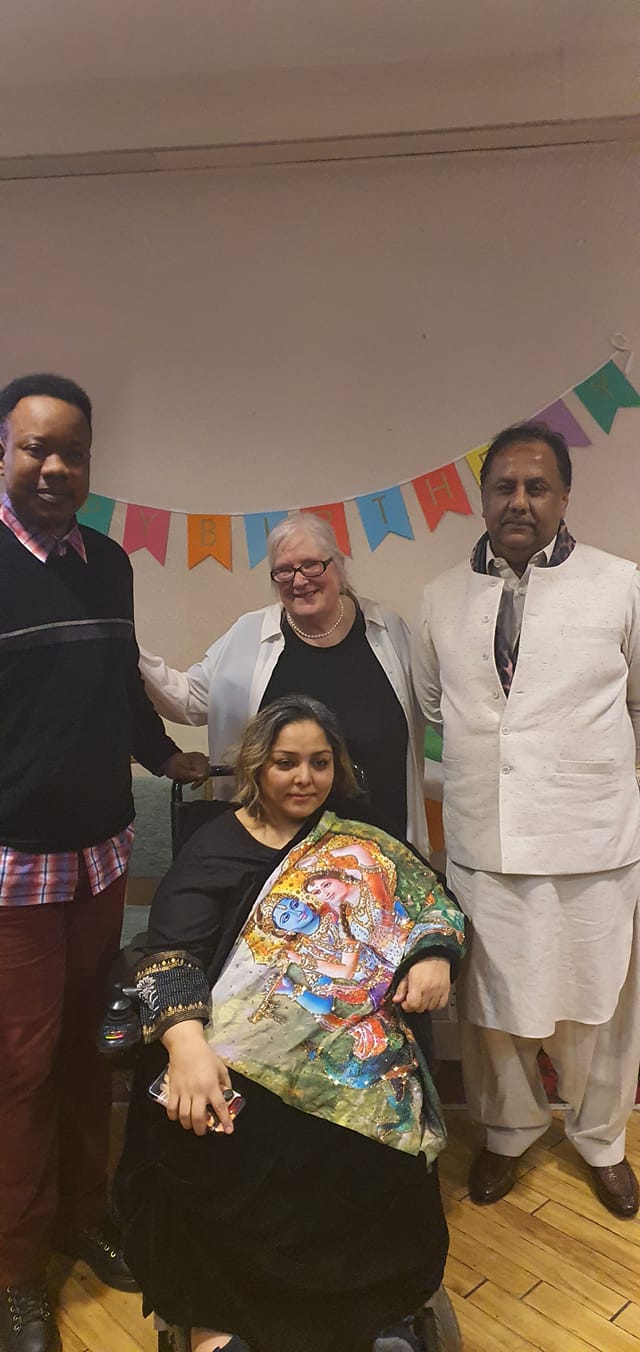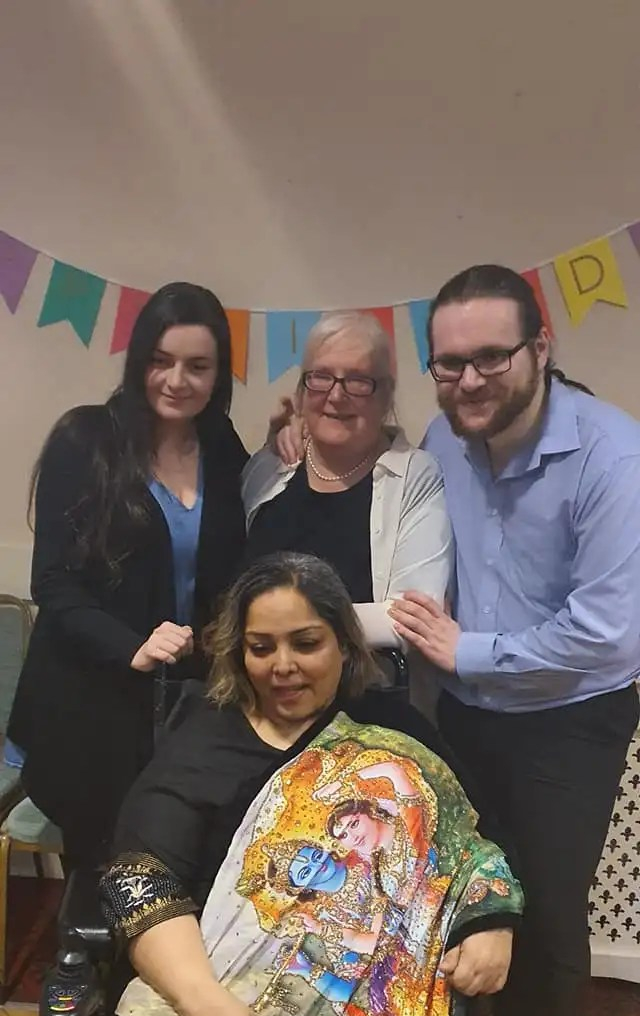
Kath is from a Lancashire radical working-class tradition. Born in Rochdale in 1950, she spent her first five years living with her parents and grandfather in “The Mount”, the Irish area in the centre of the town. Her grandparents were Irish and Scottish.
Her parents were active in the trade unions in the factories and mills in the town. Her mother, Annie, took part in the cotton strikes of the 1930s. Her father, Jim, was blacklisted as a union activist in the 1930s and had to leave the town and go south to get work. Sympathetic to communist politics he did not join the British Army until the Soviet Union joined in the war in 1941. Posted to Europe he was part of the liberation forces at the Belsen concentration camp – something he never spoke about.
After returning to Rochdale, he was elected as union representative at Turner and Newall, a company that would become notorious for its use of asbestos in its manufacturing process, resulting in a campaign to expose it. Kath remembers union members visiting their house for advice from her father.
In 1955 the family moved to a new council house – part of the post war housing expansion – where her sister was born. Kath decided at the age of 11 that she wanted to be a journalist, although her teachers told her “it is not a job for a girl.” Leaving school at 16 with academic qualifications and shorthand and typing she became a clerk. For the next two years Kath attended night school, improving her shorthand, and typing and obtaining A ‘levels in English and History.
Becoming a journalist
She borrowed an employer’s directory from the library and started writing to newspapers asking about jobs as a journalist. Eventually the Heart of England group responded and offered her a traineeship at the Banbury Guardian. Kath was now indentured for three years to the paper where they gave her on-the-job training as well as sending her off to college in Preston for block release and to obtain her professional qualifications i.e. National Council for the Training of Journalists.
One of her features was about the shooting dead of 10 innocent people by the Parachute Regiment on a council estate in Ballymurphy, Belfast in 1971. (It has become known as the Ballymurphy Massacre.) Kath spoke to a social worker who had observed the events. “I had to argue with my editor to get it printed but I had a photographer with me who backed up the story.” Fifty years later, in May 2021, Prime Minister Boris Johnson apologised to the families of Ballymurphy. Kath’s article was probably one of the first in the English press about the Ballymurphy Massacre.
In 1974, when working for the Eccles Journal, a feature she wrote about the discrimination facing gays and lesbians was pulled by the printer. Kath says “I argued with the editor. He was happy to take paid advertisements from the gay community.”
Working on the alternative press
Disillusioned over the censorship of her article about gay people she started working voluntary for the Rochdale Alternative Paper and did agency office work to pay her bills.
RAP Ltd was a workers cooperative, set up in 1973, which published Rochdale Alternative Paper, and also printed and published newspapers, magazines, books, and pamphlets with left wing sympathies.
One of the co-founders Dave Bartlett summed up the role of RAP as to “upset the establishment, challenge the powerful, and support and be the voice of the ordinary man”
In 1977 RAP used the Government’s Job Creation Programme to employ Kath for a year: she covered issues including landlord racketeering, the National Front standing in local elections and Turner and Newall.
RAP was taking up the issue of asbestos and its effect on the workforce at Turner &Newall’s. Kath’s father showed her the paper. He later died from the symptoms of asbestos and Kath wanted to expose how hazardous the conditions were at a major firm in Rochdale. At that time death by asbestos was not a recognised workplace condition. The company knew from the 1950s about the link between asbestos and cancer – but hid the research – and continued to use it in the production process until the 1970s. Kath’s research would be used in a ground-breaking documentary by Yorkshire TV called Alice A Fight for Life in 1982.
Political work
In the 1970s Kath was involved in some of the big issues of the day. She took part in an anti-National Front march in Bradford and was arrested. Refusing to pay the fine she was prepared to go to prison, but her mother stepped in and paid the fine because she wanted Kath to attend a family do that weekend.
Kath joined the Troops Out Movement who were calling for British troops to be withdrawn from Ireland and for a united Ireland. Kath says, “I always saw Ireland as an important issue.” As part of a broad left grouping, she organised a meeting where an Irish trade unionist would speak in Manchester Town Hall with the aim of building up support with local trade unions.
The National Front flooded the meeting and, after they were asked to leave, they laid siege to the building. Kath had to call on the Anti-Nazi League, who were also holding a meeting in the same building, to disperse the NF.
NUJ Branch Secretary
In 1979 she moved to the Stockport Advertiser where she was branch secretary of the National Union of Journalists – a position she has held in different workplaces over the years. A proposed merger between the Advertiser and Express led to a nine-week dispute between the union and management. This was a time when all members of the workforce were in the union. Through joint union action across all papers in the group all the NUJ members threatened with redundancy were offered a job or redundancy on favourable terms.
In her next job at the Wilmslow Express and Advertiser Kath took up the issue of women in prison. She wrote six articles about Styal Prison and the lives of the women there.
Changing Times
The 1980s saw massive changes in the relationship between unions and management in the newspaper industry. A dispute at the Stockport Messenger owned by Eddie Shah saw a major industrial dispute begin a process that would affect all trade unions in the UK. He wanted to break the closed shop agreement that existed across the provincial papers in the newspaper industry. Six National Graphical members took strike action in July 1983 and were sacked. NUJ members refused to cross the picket lines and were also sacked. The company used the new anti-trade union laws – 1980 and 1982 Employment Acts – to make illegal the boycotting of work and advertising and secondary picketing at Bury and Warrington.
Many trade unionists saw this as an attack on all trade unions and they organised across the country to join the NGA and NUJ on the picket lines. In November 1983 over 4000 union members confronted a large police force including riot squads. Kath was there and recounts, “It was very scary. It was the middle of the night and we were chased across the fields by riot police. I saw people being arrested for doing nothing and, although I gave evidence to support this in court cases, they were still found guilty.” The strike finally ended in May 1984 and the sacked workers were found work elsewhere.
Kath, like many trade unionists, believed this was a trial run for further disputes which involved unions trying to build solidarity across the labour movement. She says, “It was a test for all unions from Wapping and News International to the Miners Strikes in later years.” The NUJ was derecognised in most big papers and a new individualistic culture replaced one of union membership and collective action.
She was then working on the Leigh Journal and covered the Miners’ Strike 1984-5. One of the miners’ wives alerted her to the presence of police officers on the picket lines who were not wearing police identification. Kath rang the Police press office for a comment and then wrote the article.
The next thing that happened was that the Deputy Chief Constable of Greater Manchester Police, John Stalker, was on the phone to her editor. He accused her of not getting a police response before printing which was not true. But Kath remembers, “The editor caved in and gave Stalker a right of reply where he denied the accusation.”
Return to education…and union activities
In the 1980s Kath went to Bolton Institute of Higher Education to get a degree in English Literature and Philosophy. She was lucky: during the course her Mature student grant was abolished.
Kath met her partner Mick in 1978 and in 1991 their son Sean was born. She now worked freelance and was able to work from home and around her childcare responsibilities.
By 1994 she was back involved with her union activities and in the post of treasurer and then secretary.
In the early 2000s the Manchester and Salford NUJ branch took up the case of exiled journalist Mansoor Hassan who was forced to flee Pakistan with his family when he received death threats as a result of his exposure of political corruption. It took six years until Mansoor and his family were given settled status in the UK.
Kath’s branch worked with local organisation RAPAR ( Refugee and Asylum Participatory Action Research) to help negotiate the complicated asylum system. She says, “We have around 10 branch members who have come to the UK to seek asylum over the last 20 years. Most of them now have refugee status but we have two members who are still going through the asylum system. There are other exiled journalists in NUJ branches throughout the UK. The Branch has run campaigns for journalists seeking asylum and supported others – who did not want a public campaign to protect family – through the asylum system.”

Kath with three chairs of RAPAR that she worked with over the years – Barly, Mansoor (who is also an NUJ colleague) and Manjeet.
Looking back
The media is very different from when Kath started as an apprentice , which do not exist today. Journalists are more likely to start their training on a degree course. It also means that the opportunities for women like Kath, who came from a working-class background, are more limited.
It is now dominated by the internet, not print. Gone is the security of a union organised workplace. A deregulated media means that journalists are now expected not only write copy but film, edit etc and work across various media platforms.
Kath says, “It has always been hard for young people who are black and/or working class to get into journalism and this is still the case. Young people from working class backgrounds simply cannot afford to take the freelance, unpaid or intern routes into journalism. There are some newer schemes like the Local Democracy Reporters, a partnership between the BBC and regional news organisations, which have provided extra opportunities for young (and older) people to work as journalists. The LDR scheme should be extended to include independent media. It would have made an enormous difference to the Salford Star for example.”
Kath thinks that younger people are now seeing the benefits of being in a union. “As far as the union is concerned, we are now getting more applications from young journalists at the big regional news groups like Reach and Newsquest, from the BBC staff and freelances, other broadcasting areas, magazine groups and websites. Interest in joining the Union is often the result of low pay, stressful working conditions, redundancies etc So not much change there!”
The job may have changed but the challenges are still there with Issues such as the use of Artificial Intelligence and the work of photographers. Threats to journalists have become more widespread due to the use of social media while the freedom of the press has become a big issue across the world. Recently she was heartened to see the collective action of new, young journalists out on the picket line opposing the cuts in BBC local radio.
Kath loves being a journalist. “It is a great job. I have worked with great people – most of them NUJ activists. Originally my ambition was to get a job on the Observer’s Insight Team but I am glad I stuck with regional news. Working on local press has meant that I was able to take up an issue and report on it positively.”

Kath with Sean, Sophie, and Manjeet.
For more information about joining Manchester and Salford NUJ contact Kath at kath.northernstories@googlemail.com
Reblogged this on Anarchy in the Sticks!.